Related Research Articles
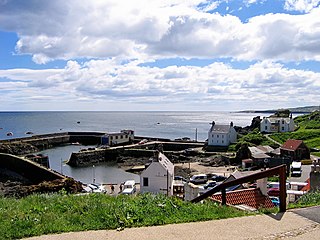
St Abbs is a small fishing village on the southeastern coast of Scotland, within the Coldingham parish of Scottish Borders.
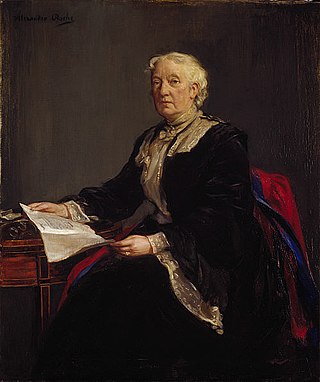
Flora Clift Stevenson was a British social reformer with a special interest in education for poor or neglected children, and in education for girls and equal university access for women. She was one of the first women in the United Kingdom to be elected to a school board.
Events from the year 1884 in Scotland.
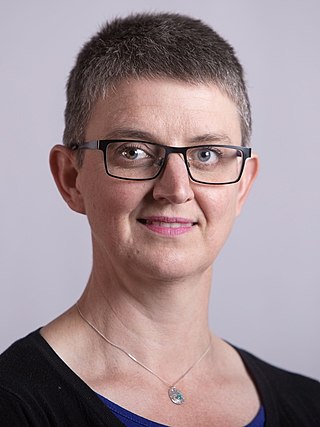
Maggie Chapman is a Scottish politician and lecturer who is a Scottish Green Member of the Scottish Parliament (MSP) for North East Scotland. She was co-convenor of the Scottish Greens from November 2013 to August 2019, serving with Patrick Harvie, and was the party's lead candidate for the 2019 European election.

St Abbs Lifeboat is an independent marine-rescue facility in St Abbs, Berwickshire, Scotland.

Mary Pollock Grant, also known as Marion Pollock, was a Scottish suffragette, Liberal Party politician, missionary and policewoman.

Wilhelmina Hay Abbott, also known by the name "Elizabeth Abbott," was a Scottish suffragist, editor, and feminist lecturer, and wife of author George Frederick Abbott.

Eliza Wigham, born Elizabeth Wigham, was a Scottish campaigner for women's suffrage, anti-slavery, peace and temperance in Edinburgh, Scotland. She was involved in several major campaigns to improve women's rights in 19th-century Britain, and has been noted as one of the leading citizens of Edinburgh. Her stepmother, Jane Smeal, was a leading activist in Glasgow and together they made the Edinburgh Ladies' Emancipation Society. Her brother John Richardson Wigham was a prominent lighthouse engineer.
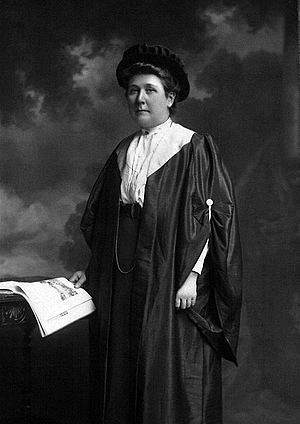
Grace Ross Cadell was a Scottish medical doctor and suffragist, and one of the first group of women to study medicine in Scotland and qualify.
Agnes Syme Macdonald was a Scottish suffragette who served as the secretary of the Edinburgh branch of the Women's Social and Political Union (WSPU) before setting up the Edinburgh Women Citizens Association (WCA) in 1918. She was WCA's first and longest-serving secretary. She campaigned on various social issues and was active in the Quaker relief work for European refugees ; the Barns School for delinquent city boys and the Edinburgh Old People's Welfare Council.

Arabella Scott was a Scottish teacher, suffragette hunger striker and women's rights campaigner. As a member of the Women's Freedom League (WFL) she took a petition to Downing Street in July 1909. She subsequently adopted more militant tactics with the Women's Social and Political Union (WSPU). She was one of a group who attempted arson at Kelso racecourse in May 1913. She was arrested many times and went on hunger strikes when she was sent to jail. Whilst in Perth Prison in 1914, she was force-fed for an extraordinarily long time under the supervision of Dr Hugh Ferguson Watson, the only prison doctor in Scotland prepared to use this method. She was released under the controversial Cat and Mouse Act. WSPU activism ceased when the First World War began and Scott became a field nurse, later she married emigrated to Australia. She wrote about her experiences in her autobiography A Murky Past.

Agnes Husband was one of Dundee's first female councillors and was a suffragette. She was awarded Freedom of the City at the age of 74 and has a plaque to her memory in the Dundee City Chambers and a portrait by Alec Grieve is in the McManus Galleries and Museum.

Lila Clunas was a Scottish suffragette, educator, and Labour Party councillor. She was known as one of the leading suffragettes in Dundee.
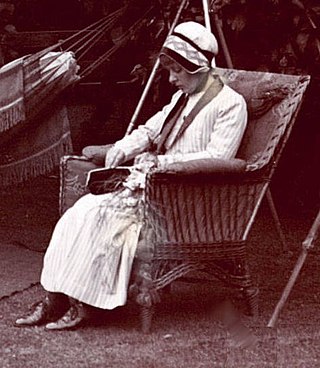
Florence Geraldine Macfarlane aka "Muriel Muir" was a nurse, militant suffragette and member of the Women's Social and Political Union (WSPU) who went on hunger strike in Winson Green Prison in Birmingham in 1912 and who was awarded the WSPU's Hunger Strike Medal.
Muriel Eleanor Scott (1888–1963), was a Scottish suffragette, hunger striker, and protest organiser. Her sister Arabella Scott was force-fed many times, and Muriel Scott led protests about this cruel treatment.
Elizabeth Finlayson Gauld was a leading suffrage campaigner in Edinburgh devoted to working for women’s franchise for many years, convening meetings, taking part in the Women’s March from Edinburgh to London, working with some of the most prominent suffrage campaigners and activists for women's rights. She was also prominent in the campaign for Scottish self-determination and in amateur theatre productions.
Alice Low, (1877–1954) was a British suffragist, who spoke up for peaceful means of achieving women's rights to vote, and fairer laws, including reducing sweated labour. She was a leader in Edinburgh and Berwickshire National Union of Women's Suffrage Societies (NUWSS) and a touring speaker in the early twentieth century. She was also a lead member of Queen Mary's Army Auxiliary Corps. (QMAAC) in World War One and an amateur actress taking lead roles with the British Empire Shakespeare Society.

Mary H J Henderson was an administrator with Elsie Inglis's Scottish Women's Hospitals for Foreign Service in the Balkans in World War I, earning five medals. She founded social work and civic groups led by women, in Dundee, Aberdeen and London and served on charitable bodies including Dundee War Relief Fund, and worked for women's suffrage. She was also a war poet.
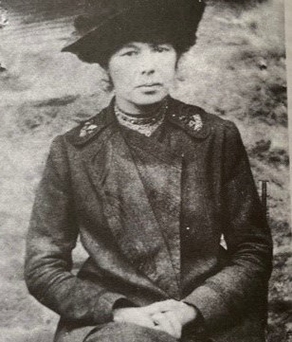
Annie Walker Craig (1864–1948) was a British socialist, political activist and suffragette active in England and Scotland. She participated in many direct action campaigns and often gave a false name - notably Rhoda Robinson, Annie Walker Greig, and Annie Rhonda Walker - to the police to thwart further investigation or criminal charges. She was described in The Suffrage Annual, and Women's Who's Who of 1913 as "the first militant Suffragette in Scotland".
Isabel Cowe was a Scottish suffragist, campaigner for the local Royal National Lifeboat Institution (RNLI) and boarding house owner. She was nicknamed the "Provost of St Abbs".
References
- 1 2 3 4 5 Ewan, Elizabeth, ed. (2018). The new biographical dictionary of Scottish women. Edinburgh: Edinburgh University Press. p. 194. ISBN 978-1-4744-3629-8. OCLC 1057237368.
- ↑ "Death of Mr James Hay, Leith". Dundee Evening Telegraph. 20 January 1880. Retrieved 28 January 2022.
- 1 2 3 4 5 6 7 8 "A noted Scotswoman". Berwickshire News and General Advertiser. 3 February 1914. p. n.p. Retrieved 2 February 2022.
- 1 2 "Here and There". Dundee Evening Telegraph. 16 October 1907. p. 2. Retrieved 28 January 2022.
- ↑ Caledonia (15 August 1895). "Scottish Echoes". Women's Penny Paper. p. 8. Retrieved 1 February 2022.
- 1 2 "Miss Jane Hay off to Athens". Edinburgh Evening News. 26 November 1896. p. 2. Retrieved 1 February 2022.
- 1 2 "The Greek Refugee's Committee". The Times. 15 January 1898. p. 14. Retrieved 1 February 2022.
- 1 2 3 "Obituary". Newcastle Journal. 28 January 1914. p. 5.
- ↑ "Untitled". Edinburgh Evening News. 6 June 1899. p. n.p. Retrieved 1 February 2022.
- ↑ "Request for a Lifeboat at St Abbs". Dundee Evening Telegraph. 15 November 1907. p. 2. Retrieved 28 January 2022.
- ↑ "Miss Jane Hay of St Abbs". Votes for Women. 13 February 1914. p. 305. Retrieved 2 February 2022.
- ↑ McCall, Alison (23 June 2024). "Mapping Memorials to Women in Scotland, Isabel Cowe". The Women of Scotland. Retrieved 22 November 2024.
- ↑ "Highland Mod in Edinburgh". Glasgow Herald. 6 October 1899. p. 10. Retrieved 1 February 2022.